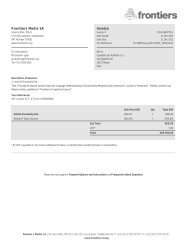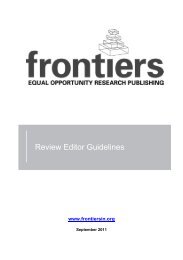Sweating the Small Stuff: Does data cleaning and testing ... - Frontiers
Sweating the Small Stuff: Does data cleaning and testing ... - Frontiers
Sweating the Small Stuff: Does data cleaning and testing ... - Frontiers
- No tags were found...
Create successful ePaper yourself
Turn your PDF publications into a flip-book with our unique Google optimized e-Paper software.
SWEATING THE SMALL STUFF:DOES DATA CLEANING ANDTESTING OF ASSUMPTIONS REALLYMATTER IN THE 21ST CENTURY?Topic Editor:Jason W. Osborne, University of Louisville, USAModern statistical software makes it easier than ever to do thorough <strong>data</strong> screening/<strong>cleaning</strong> <strong>and</strong>to test assumptions associated with <strong>the</strong> analyses researchers perform.However, few authors (even in top-tier journals) seem to be reporting <strong>data</strong> <strong>cleaning</strong>/screening<strong>and</strong> <strong>testing</strong> assumptions associated with <strong>the</strong> statistical analyses being reported. Few populartextbooks seem to focus on <strong>the</strong>se basics.In <strong>the</strong> 21st Century, with our complex modern analyses, is <strong>data</strong> screening <strong>and</strong> <strong>cleaning</strong> stillrelevant? Do outliers or extreme scores matter any more? <strong>Does</strong> having normally distributedvariables improve analyses? Are <strong>the</strong>re new techniques for screening or <strong>cleaning</strong> <strong>data</strong> thatresearchers should be aware of?Are most analyses robust to violations of most assumptions, to <strong>the</strong> point that researchers reallydon’t need to pay attention to assumptions any more?My goal for this special issue is examine this issue with fresh eyes <strong>and</strong> 21st century methods.I believe that we can demonstrate that <strong>the</strong>se things do still matter, even when using “robust”methods or non-parametric techniques, <strong>and</strong> perhaps identify when <strong>the</strong>y matter MOST or inwhat way <strong>the</strong>y can most substantially affect <strong>the</strong> results of an analysis.I believe we can encourage researchers to change <strong>the</strong>ir habits through evidence-baseddiscussions revolving around <strong>the</strong>se issues. It is possible we can even convince editors ofimportant journals to include <strong>the</strong>se aspects in <strong>the</strong>ir evaluation /review criteria, as many journalsin <strong>the</strong> social sciences have done with effect size reporting in recent years.I invite you to join me in demonstrating WHY paying attention to <strong>the</strong>se mundane aspects ofquantitative analysis can be beneficial to researchers.<strong>Frontiers</strong> in Psychology August 2013 | <strong>Sweating</strong> <strong>the</strong> <strong>Small</strong> <strong>Stuff</strong>: <strong>Does</strong> <strong>data</strong> <strong>cleaning</strong> <strong>and</strong> <strong>testing</strong> of assumptions really matter in <strong>the</strong> 21st century? | 2














